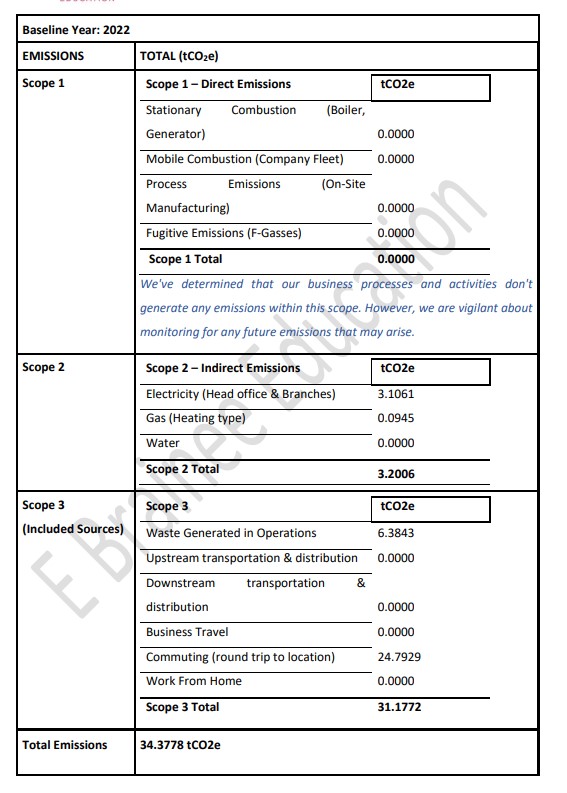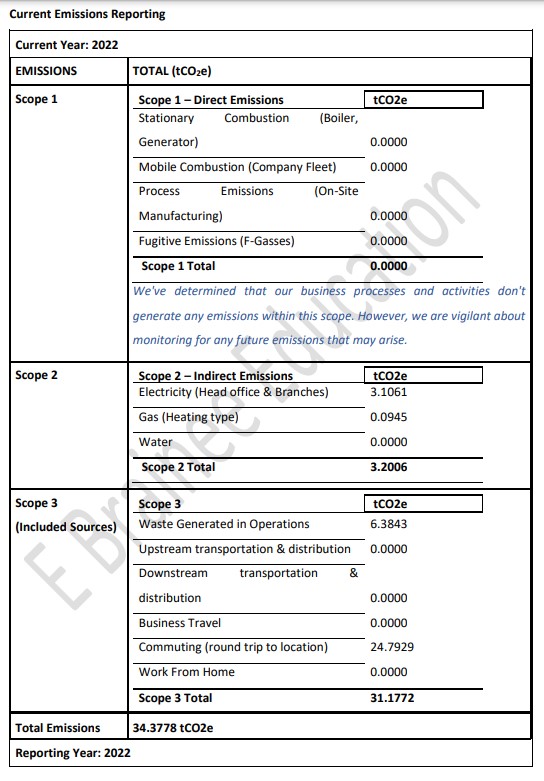e Brainee Education’s Carbon Reduction Plan
Introduction:
e Brainee Education is committed to empowering healthcare professionals through ongoing professional development opportunities. Our fundamental principles encompass integrity, focus, reliability, and availability, ensuring top-notch services that meet the needs of both our clients and employees. In alignment with our dedication to excellence and accountability, we are crafting our inaugural carbon reduction strategy to support environmental sustainability.
Objective:
The healthcare industry accounts for approximately 4 to 5 percent of the country's carbon footprint. e Brainee Education's Carbon Reduction Plan aims to reduce our carbon footprint, advocate for environmentally friendly practices, and cultivate a sustainable culture within our operations. This aligns with the NHS Greener NHS Strategy's goal of achieving net zero emissions.
Pillars of Sustainability:
Human, social, economic, and environmental are known as the four pillars of sustainability and the below points focus on our steps to strengthen.
Data Compilation:
As a first step in our carbon reduction plan, we will undertake data compilation to assess our current environmental impact. This process will involve gathering and analysing data on our energy consumption, waste production, and other relevant factors. We will use this data to establish a baseline for our carbon emissions.
Averages and Estimations:
In areas where comprehensive data is not readily available, we will make use of industry averages and estimations to approximate our environmental impact. While this approach is a temporary solution, we will actively work on improving our data collection and measurement processes for more accurate reporting in the future.
Pillars of Sustainability
Human, social, economic, and environmental aspects are recognised as the four pillars of sustainability. The following points outline our efforts to enhance these pillars.
Data Compilation
To commence our carbon reduction strategy, the initial step involves gathering data to assess our present environmental impact. This phase entails the compilation and analysis of data related to our energy consumption, waste production, and other relevant factors. The objective is to establish a baseline for our carbon emissions.
Averages and Estimations
When detailed data is unavailable, we will rely on industry averages and estimations to gauge our environmental impact. While this approach is interim, we are dedicated to improving our data-gathering and evaluation methods for more accurate reporting in the future.
Key Initiatives:
1. Environmental Sustainability: Energy Efficiency:
Conduct an energy audit to pinpoint areas for reducing energy consumption.
Upgrade to energy-efficient lighting, heating, and cooling systems in our workspace.
Encourage remote work and telecommuting to decrease the necessity for physical office space.
2. Economic Sustainability - Waste Reduction:
Establish a recycling program for office supplies.
Promote digital documentation and communication to minimize paper use.
Assess suppliers for eco-friendly packaging solutions.
3. Human Sustainability - Transportation:
Advocate for carpooling, public transportation, and telecommuting among our employees.
Investigate the use of electric or hybrid vehicles for business travel.
4. Social and Human Sustainability - Education and Awareness:
Educate employees and stakeholders on the significance of carbon footprint reduction.
Offer training and resources to help employees integrate sustainable practices into their daily lives.
Monitoring and Reporting
e Brainee Education is dedicated to regularly monitoring and reporting our progress in reducing carbon emissions. We will define key performance indicators (KPIs) and monitor our initiatives, adjusting as needed to achieve our environmental objectives.
Conclusion
e Brainee Education's Carbon Reduction Plan marks a significant stride in aligning our business practices with environmental sustainability. While we kick off with data gathering and employing averages in data-deficient areas, our focus remains on enhancing our environmental impact evaluation processes and implementing efficient carbon reduction strategies. By playing our role, we aim to contribute to a greener, more sustainable future, all while upholding our top-notch service standards for clients and candidates.
e Brainee Education' Carbon Reduction Plan
Publication date: 01st December 2023
We are committed to achieving Net Zero emissions by 2040. We've chosen January 1st to December 31st as the foundational year for reporting our carbon emissions.
Baseline Emission Report: e Brainee Education
Introduction:
This report on baseline emissions details the initial actions undertaken by e Brainee Education, a healthcare recruitment agency, to evaluate and set a starting point for its carbon emissions. When data was lacking, industry averages were employed to approximate emissions, laying the groundwork for future reporting and reduction plans.
Data Compilation Process:
e Brainee Education initiated its carbon emissions assessment by compiling data from various sources within the organization. The key areas considered in data collection included:
Office Energy Consumption: Data on electricity and heating/cooling usage was gathered by reviewing utility bills, meter readings, and equipment specifications.
Waste Production: The amount of paper waste, recyclables, and general waste generated by the organization was quantified.
Transportation: Records of business-related travel, including staff commuting, were compiled.
Supply Chain: Information on the environmental impact of suppliers' packaging and transportation was collected.
Using Averages to Establish a Baseline:
e Brainee Education encountered difficulties in acquiring accurate data on multiple occasions, leading to the utilization of industry averages to estimate emissions. The main areas where averages were utilized are:
Employee Commuting: Data on employee commuting habits and vehicle types were not available, so industry-standard figures for emissions associated with employee travel were used.
Supplier Emissions: Supplier-specific emissions data for the supply chain was not accessible. Instead, averages for transportation and packaging emissions in the healthcare sector were employed.
Carbon Offset Calculation: Due to limited data, E Brainee Education relied on industry-standard calculations to estimate the emissions offset through investments in carbon offset programs.
Baseline Emission Figures (Tons of CO2 Equivalent):
The baseline carbon emissions for e Brainee Education, including both measured and estimated data, are as follows:
Office Energy Consumption: 3.10061 tCO2e
Waste Production: 6.3843 tCO2e
Employee Commuting: 24.7929 tCO2e
Supplier Emissions: Currently this data is not available. However, we endeavor to keep monitoring and collaborating with our supply chain to achieve the figures in the coming years.
Future Reporting and Improvement:
e Brainee Education acknowledges the limitations of using averages in some areas of our baseline emissions report. To improve future reporting and reduction efforts, the organization pledges to:
Enhance Data Collection: Invest in better data collection methods to precisely measure energy consumption, waste generation, and other emission sources.
Employee Commuting Data Accuracy: Collect information on employee commuting patterns to more accurately estimate emissions linked to staff travel.
Engage with Suppliers: Work closely with suppliers to acquire specific emissions data for a more precise representation of supply chain emissions.
Ongoing Monitoring: Consistently monitor and report emissions data to track progress and adjust reduction strategies as necessary.
By concentrating on data enhancement and carbon emission reduction, e Brainee Education is committed to making positive contributions to environmental sustainability and striving for a greener future while upholding high service standards for our clients and candidates.


Carbon Reduction Projects and Targets for e Brainee Education (2023-2028)
Project 1: Office Energy Efficiency (2023-2024)
Targets:
Decrease office energy consumption by 15% over the next two years.
Improve energy efficiency by switching to energy-saving lighting and smart thermostats to reduce energy waste.
Introduce solar panels on the office premises to produce clean energy and lessen dependence on grid electricity as appropriate, or suggest the landlord consider the advantages of such solutions.
Project 2: Waste Reduction (2023-2025)
Targets:
Establish a thorough recycling program to divert 75% of office waste from landfills by 2025.
Encourage a paperless office culture with the goal of reducing paper consumption by 50% within the next two years.
Work together with environmentally conscious suppliers to minimize unnecessary packaging and waste production.
Project 3: Sustainable Transportation (2023-2028)
Targets:
Encourage employees to carpool, use public transportation, or telecommute to achieve a 20% decrease in commuting-related emissions by 2025.
Establish a telecommuting policy for eligible employees to decrease the demand for physical office space and lower commuting emissions.
Project 4: Supplier Engagement (2024-2026)
Targets:
Work together with essential suppliers to acquire detailed emissions data and collaborate with them to decrease emissions in the supply chain.
Establish a supplier sustainability initiative, prioritizing environmentally conscious suppliers.
Set goals for reducing supplier emissions, targeting a 10% decrease in supply chain emissions by 2026.
Project 5: Carbon Offset Programs (Ongoing)
Targets:
Keep supporting carbon offset programs to offset emissions that cannot be reduced immediately.
Annually assess offset needs and boost investments to attain carbon-neutral operations.
Discover inventive carbon offset projects like reforestation and renewable energy initiative.
Project 6: Employee Education and Engagement (Ongoing)
Targets:
Organize frequent sustainability training sessions for staff to enhance awareness and advocate for eco-friendly practices.
Motivate employees to propose and engage in carbon reduction projects.
Acknowledge and reward employees for their dedicated participation in sustainability endeavors.
Project 7: Regular Reporting and Adjustment (Ongoing)
Targets:
Create an annual carbon emissions report to monitor progress, aiming to decrease total emissions by 10% annually.
Continuously review and refine the carbon reduction strategy to integrate new technologies and industry best practices.
Strive to attain carbon neutrality by 2028 for E Brainee Education by reducing and compensating for all emissions produced.
e Brainee Education's dedication to carbon reduction projects and goals for the upcoming five years demonstrates our strong commitment to environmental sustainability and an eco-friendlier future. We will continue to maintain top-notch service for both our clients and candidates.
Declaration
The Carbon Reduction Plan has been finalized following PPN 06/21, along with the related guidance and reporting standard for Carbon Reduction Plans.
Emissions have been documented and accounted for following the specified reporting standard for Carbon Reduction Plans and the GHG Reporting Protocol corporate standard. The plan also utilizes the appropriate Government emission conversion factors for company reporting on greenhouse gases.
Scope 1 and Scope 2 emissions have been disclosed in compliance with SECR requirements, while the essential subset of Scope 3 emissions has been reported following the published reporting standard for Carbon Reduction Plans and the Corporate Value Chain (Scope 3) Standard.
This Carbon Reduction Plan has undergone a thorough review and endorsement by the board of directors (or equivalent management body).
| Name | G Gopalakrishnan |
| Job Title | Policy Administrator |
| Date | 01/12/2023 |
Policy dated: 1st Dec 2023